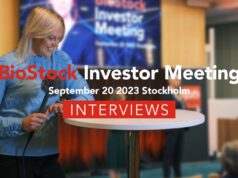
Cyxone comments on the clinical collaboration in the UK
Cyxone has entered into a research collaboration with a renowned British research group in Glasgow with the aim of conducting an exploratory phase II study with rabeximod in rheumatoid arthritis patients. BioStock reached out to CEO Carl-Magnus Högerkorp, who highlights the research group’s collaboration with the universities of Birmingham, Newcastle, and Oxford in the field.
Patients suffering from rheumatoid arthritis (RA) cannot currently count on their disease to be cured. RA is an inflammation of the joints that, if left untreated, often leads to the breakdown of bone and cartilage, functional impairments, pain, stiffness, and chronic fatigue.
Since there are no curative treatments, these patients are instead treated with symptom-relieving drugs. These include NSAIDs (non-steroidal anti-inflammatory drugs) and corticosteroids that are supposed to have a short-term effect. And then there are disease-modifying antirheumatic drugs, DMARDs, whose effect can only be measured after a period of treatment.
Cyxone wants to offer a better treatment option
Malmö-based Cyxone has identified the problem that many RA patients, up to 40–60 per cent of those treated with TNFα blockers, gradually stop responding to the treatment. Thus, this is the group of patients that the company focuses on.
The company’s pipeline consists of the lead candidate rabeximod for the treatment of rheumatoid arthritis (RA) and T20K for the treatment of multiple sclerosis (MS). Right now, the company is in clinical phase II development, intending to offer better treatments than today’s DMARDs, such as TNFα inhibitors.
New collaboration in the UK
Recently, Cyxone identified the biological target protein for rabeximod, which provided a more detailed insight into the mechanism of action, i.e. how the candidate affects the pro-inflammatory cells.
Having a good picture of the mechanism of action is important to move forward in partnering discussions. Proof of this came this week when the company announced a collaboration with researchers at the School of Infection & Immunity, University of Glasgow, led by Professor Iain McInnes. The goal of the collaboration is to conduct an exploratory phase II study with rabeximod in patients with rheumatoid arthritis.
According to Cyxone, this is one of the most distinguished centres in the world for research on RA and other immune-related inflammatory diseases.
In a press release, Professor McInnes expressed his interest in ascertaining more details about rabeximod’s mechanism of action:
»We are excited to enter this research collaboration with the Cyxone team. It is a very interesting project that we see before us. And having followed the development of rabeximod over the years I am looking forward to now learn more about how the molecule works in greater detail«

Comments from the CEO
BioStock spoke to Cyxone’s CEO Carl-Magnus Högerkorp to find out more about the collaboration.
How did this collaboration come about, and what significance has your latest research played in making it happen?
– It is incredibly exciting to establish this collaboration with the group in Glasgow. Professor McInnes is a world-leading rheumatologist and a leading researcher in the field who has strongly influenced the new direction of research in immune-mediated inflammatory diseases with an emphasis on precision medicine. The group in Glasgow is also at the forefront of research on the importance of macrophages in RA. Several very important scientific studies have therefore come from the group over the years.
– In line with our strategy of conducting studies with leading clinicians, we had a dialogue with Professor McInnes and several of his colleagues, where we began to discuss an exploratory study based on the framework for precision medicine studies that they have conducted in recent years. Since the Glasgow group also has a strong interest in the regulation of macrophages and had previous knowledge of rabeximod, we saw the value of conducting studies together.
Can you talk about the research group in Glasgow but also about the consortium RACE and what role Cyxone will play here?
– Glasgow is part of the RACE consortium, which consists of other very strong research environments linked to the universities of Birmingham, Newcastle and Oxford. Several of the experts in this consortium have also been consulted during the discussions that led to the collaboration. Among these, there is a shared interest in how rabeximod regulates macrophages, so we see great interest from RACE members in the study we are planning with Glasgow.
You will conduct an exploratory phase II study with rabeximod in patients with rheumatoid arthritis. Can you tell us how this will be implemented and what the timetable looks like?
– In line with our new strategy, we have focused on a new patient segment that we now intend to take a closer look at in exploratory studies. Preparations are underway and once all documentation is in place, a formal application to the UK Medicines and Healthcare products Regulatory Agency will be made. The idea is to conduct an open-label clinical study where we will document in detail how rabeximod works in patients with RA.
– The purpose of the studies is to provide significantly increased knowledge about the drug in order to facilitate continued development and to create a good basis for discussions with strategic partners.
The content of BioStock’s news and analyses is independent but the work of BioStock is to a certain degree financed by life science companies. The above article concerns a company from which BioStock has received financing.

